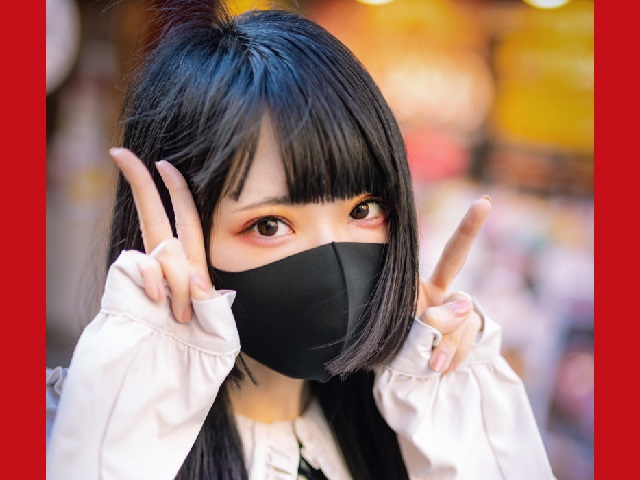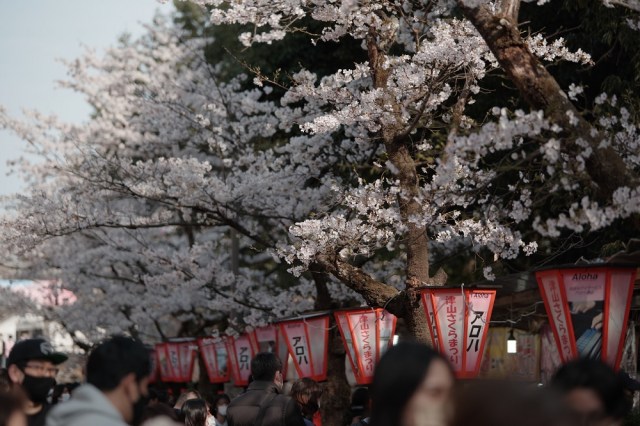
Combination of factors is keeping masks on in Tokyo even as the government says they don’t have to be.
On March 13, Japan’s Ministry of Health, Labor, and Welfare revised its mask recommendations, saying that the wearing of masks as a coronavirus countermeasure will now be “left to personal judgement.” But unlike in some other parts of the world, the lifting of masking recommendations didn’t result in a mass peeling off of face covering and an audible satisfied sigh from the people of Japan.
Instead, our reporters found that little had changed in the days immediately following the relaxed guidelines, as the vast majority of people we saw in Tokyo, both indoors and out, remained masked up while around others, and broadcaster Nippon Television Network had similar observations. Setting up a camera on a busy street outside Tokyo Station on March 13, the network found that 89.7 percent of passersby were masked up.
But one month later, has baseline behavior changed? On April 10 (which, like May 13, was a Monday), Nitele repeated the experiment at the same location, at the same time of day, and the result was…
…pretty much the same. Nearly a month after “follow your personal judgement” became the government’s stance on masks, the vast majority, 85.6 percent, of people were still wearing masks this past Monday.
There are a couple of likely reasons why, starting with the fact that Tokyo is seeing an uptick in its number of new coronavirus infections. On February 27, the city saw 1,028 new infections, but the daily number dipped below 1,000, and stayed down there, all the way until March 26. Since then, though, there have been six more days with over 1,000 new infections, including five in row from April 2 to April 6 (and with 956 on April 7, Tokyo just barely missed having six over-1,000 days in a row).
There’s also the fact that cherry blossom season, which started in late March this year, is really the first significant “get out and go places” occasion in quite some time. Though many travel and event regulations were scaled back last fall, the next major vacation period in Japan wasn’t until New Year’s, which most people celebrate by going back to their hometowns and relaxing at home with family. Cherry blossom season, though, involved a lot more close contact with others at crowded parks and hanami (cherry blossom-viewing) parties, which also means a lot more clustering in famous sakura spots and their associated transportation access points. So with more people moving around, staying masked likely seems like a good idea to many.
Another major factor is that it’s hay fever season in Japan right now. The country’s high concentrations of eminently allergenic pollen had made masking up part of spring for many long before the coronavirus pandemic. With masks already so prevalent at this time of year, you’re not going to look odd at all with one on, and so even people who don’t suffer from hay fever, but are still a little leery about the possibility of coronavirus infection, can remain masked up without feeling self-conscious.
And last, but definitely not least, is that even before the government made their recommendation official on March 13, a lot of the masking that was going on in Japan was already largely a matter of personal judgement. Even during the height of the pandemic, a lot of the masking taking place wasn’t due to legal requirements, but a general sense of “Well, this might be sort of a hassle, but if it helps prevent people getting sick, then I’ll do it.” Being willing to take on a bit of personal inconvenience for the public good is one of Japan’s defining societal values, and complaining about it is a pretty quick way to earn a reputation as selfish and immature. So even as Nitele’s study shows masks becoming slightly less common, they’re still the norm in Japan, and probably will be for a while longer.
Source: Nitele via Livedoor News via Hachima Kiko, Tokyo Metropolitan Government
Top image: Pakutaso
Insert image: Pakutaso
● Want to hear about SoraNews24’s latest articles as soon as they’re published? Follow us on Facebook and Twitter!


 Mask rules in Japan have changed…so are people still wearing them?
Mask rules in Japan have changed…so are people still wearing them? Masks should still be worn indoors, majority of Japanese people in poll say
Masks should still be worn indoors, majority of Japanese people in poll say Masks appear on statues of Japan’s loyal dog Hachiko, but only one gets to keep it【Photos】
Masks appear on statues of Japan’s loyal dog Hachiko, but only one gets to keep it【Photos】 Politician’s disgusting mask gaffe grosses out Japan【Video】
Politician’s disgusting mask gaffe grosses out Japan【Video】 Japanese government may encourage people to reuse masks as coronavirus-caused shortage continues
Japanese government may encourage people to reuse masks as coronavirus-caused shortage continues Red light district sushi restaurant in Tokyo shows us just how wrong we were about it
Red light district sushi restaurant in Tokyo shows us just how wrong we were about it Japan’s massive matcha parfait weighs 6 kilos, contains hidden surprises for anyone who eats it
Japan’s massive matcha parfait weighs 6 kilos, contains hidden surprises for anyone who eats it Limited-edition Carbonara Udon will anger noodle purists and pasta lovers 【Taste test】
Limited-edition Carbonara Udon will anger noodle purists and pasta lovers 【Taste test】 Sandwiches fit for a sumo served up in Osaka【Taste Test】
Sandwiches fit for a sumo served up in Osaka【Taste Test】 McDonald’s new Happy Meals offer up cute and practical Sanrio lifestyle goods
McDonald’s new Happy Meals offer up cute and practical Sanrio lifestyle goods Historical figures get manga makeovers from artists of Spy x Family, My Hero Academia and more
Historical figures get manga makeovers from artists of Spy x Family, My Hero Academia and more Pokémon Sleep camping suite and guestrooms coming to Tokyo Hyatt along with giant Snorlax burgers
Pokémon Sleep camping suite and guestrooms coming to Tokyo Hyatt along with giant Snorlax burgers Tokyo Tsukiji fish market site to be redeveloped with 50,000-seat stadium, hotel, shopping center
Tokyo Tsukiji fish market site to be redeveloped with 50,000-seat stadium, hotel, shopping center Akihabara pop-up shop sells goods made by Japanese prison inmates
Akihabara pop-up shop sells goods made by Japanese prison inmates Shabani the gorilla is so handsome he’ll be appearing on sweets in Japan this Valentine’s Day
Shabani the gorilla is so handsome he’ll be appearing on sweets in Japan this Valentine’s Day All-you-can-drink Starbucks and amazing views part of Tokyo’s new 170 meter-high sky lounge
All-you-can-drink Starbucks and amazing views part of Tokyo’s new 170 meter-high sky lounge More foreign tourists than ever before in history visited Japan last month
More foreign tourists than ever before in history visited Japan last month Japanese ramen restaurants under pressure from new yen banknotes
Japanese ramen restaurants under pressure from new yen banknotes French Fries Bread in Tokyo’s Shibuya becomes a hit on social media
French Fries Bread in Tokyo’s Shibuya becomes a hit on social media Studio Ghibli releases new action figures featuring Nausicaä of the Valley of the Wind characters
Studio Ghibli releases new action figures featuring Nausicaä of the Valley of the Wind characters New private rooms on Tokaido Shinkansen change the way we travel from Tokyo to Kyoto
New private rooms on Tokaido Shinkansen change the way we travel from Tokyo to Kyoto Starbucks reopens at Shibuya Scramble Crossing with new look and design concept
Starbucks reopens at Shibuya Scramble Crossing with new look and design concept Studio Ghibli glasses cases let anime characters keep an eye on your spectacles
Studio Ghibli glasses cases let anime characters keep an eye on your spectacles Beautiful Ghibli sealing wax kits let you create accessories and elegant letter decorations【Pics】
Beautiful Ghibli sealing wax kits let you create accessories and elegant letter decorations【Pics】 Studio Ghibli releases Kiki’s Delivery Service chocolate cake pouches in Japan
Studio Ghibli releases Kiki’s Delivery Service chocolate cake pouches in Japan New definition of “Japanese whiskey” goes into effect to prevent fakes from fooling overseas buyers
New definition of “Japanese whiskey” goes into effect to prevent fakes from fooling overseas buyers Our Japanese reporter visits Costco in the U.S., finds super American and very Japanese things
Our Japanese reporter visits Costco in the U.S., finds super American and very Japanese things Studio Ghibli unveils Mother’s Day gift set that captures the love in My Neighbour Totoro
Studio Ghibli unveils Mother’s Day gift set that captures the love in My Neighbour Totoro New Japanese KitKat flavour stars Sanrio characters, including Hello Kitty
New Japanese KitKat flavour stars Sanrio characters, including Hello Kitty New Pokémon cakes let you eat your way through Pikachu and all the Eevee evolutions
New Pokémon cakes let you eat your way through Pikachu and all the Eevee evolutions Disney princesses get official manga makeovers for Manga Princess Cafe opening in Tokyo
Disney princesses get official manga makeovers for Manga Princess Cafe opening in Tokyo Sales of Japan’s most convenient train ticket/shopping payment cards suspended indefinitely
Sales of Japan’s most convenient train ticket/shopping payment cards suspended indefinitely Sold-out Studio Ghibli desktop humidifiers are back so Totoro can help you through the dry season
Sold-out Studio Ghibli desktop humidifiers are back so Totoro can help you through the dry season Japanese government to make first change to romanization spelling rules since the 1950s
Japanese government to make first change to romanization spelling rules since the 1950s Ghibli founders Toshio Suzuki and Hayao Miyazaki contribute to Japanese whisky Totoro label design
Ghibli founders Toshio Suzuki and Hayao Miyazaki contribute to Japanese whisky Totoro label design Doraemon found buried at sea as scene from 1993 anime becomes real life【Photos】
Doraemon found buried at sea as scene from 1993 anime becomes real life【Photos】 Tokyo’s most famous Starbucks is closed
Tokyo’s most famous Starbucks is closed One Piece characters’ nationalities revealed, but fans have mixed opinions
One Piece characters’ nationalities revealed, but fans have mixed opinions We asked a Uniqlo employee what four things we should buy and their suggestions didn’t disappoint
We asked a Uniqlo employee what four things we should buy and their suggestions didn’t disappoint Princesses, fruits, and blacksmiths: Study reveals the 30 most unusual family names in Japan
Princesses, fruits, and blacksmiths: Study reveals the 30 most unusual family names in Japan World-first confirmation that masks can protect you from coronavirus【Video】
World-first confirmation that masks can protect you from coronavirus【Video】 Japanese model cuts up her bra and turns it into a face mask
Japanese model cuts up her bra and turns it into a face mask Chinese people hand out free surgical masks in Japan as coronavirus outbreak continues【Video】
Chinese people hand out free surgical masks in Japan as coronavirus outbreak continues【Video】 Lace Bra face masks go on sale in Japan, immediately sell out【Photos】
Lace Bra face masks go on sale in Japan, immediately sell out【Photos】 No screaming on roller coasters, please, say Tokyo Disneyland, other Japanese amusement parks
No screaming on roller coasters, please, say Tokyo Disneyland, other Japanese amusement parks Japanese fashion company develops fabric mask with velcro-edge eating technology
Japanese fashion company develops fabric mask with velcro-edge eating technology Man kicked out of Japan’s national college entrance exam for improper mask-wearing technique
Man kicked out of Japan’s national college entrance exam for improper mask-wearing technique Kobe hospital robbed of 6,000 surgical masks
Kobe hospital robbed of 6,000 surgical masks No Tokyo cherry blossom parties? Government asks citizens to refrain from outdoor hanami parties
No Tokyo cherry blossom parties? Government asks citizens to refrain from outdoor hanami parties Kyoto tourist crowds disappearing due to coronavirus outbreak, creating travel crisis/opportunity
Kyoto tourist crowds disappearing due to coronavirus outbreak, creating travel crisis/opportunity Japanese hotels likely to legally require travelers to wear masks under revised regulation
Japanese hotels likely to legally require travelers to wear masks under revised regulation Overseas otaku make huge donation of masks to real-life Japanese Love Live! town
Overseas otaku make huge donation of masks to real-life Japanese Love Live! town You can now get stick-on salon masks for haircuts in the coronavirus age in Japan
You can now get stick-on salon masks for haircuts in the coronavirus age in Japan Special warm face masks for winter go on sale in Japan, and we test them out
Special warm face masks for winter go on sale in Japan, and we test them out Cherry blossom forecast 2020 released! Sakura season shifts to new start time in Tokyo this year
Cherry blossom forecast 2020 released! Sakura season shifts to new start time in Tokyo this year Psychology professor says Japanese people show mood with their eyes, Westerners with their mouths
Psychology professor says Japanese people show mood with their eyes, Westerners with their mouths
Leave a Reply